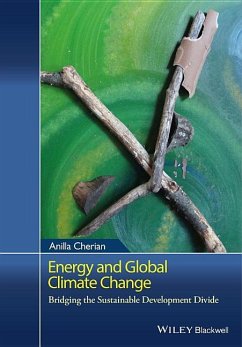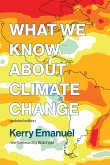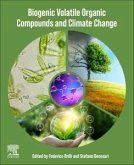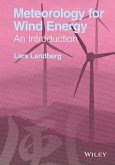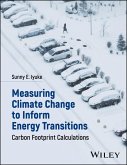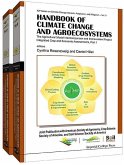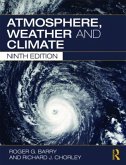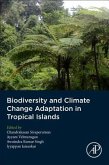- Gebundenes Buch
- Merkliste
- Auf die Merkliste
- Bewerten Bewerten
- Teilen
- Produkt teilen
- Produkterinnerung
- Produkterinnerung
"This book, is exactly the expansion of the concept of energy access for poor in terms of its linkages with climate change and sustainable development that is the main focus of investigation. In this regard, the argument that is advanced is not whether and how to increase energy access for the poor, or whether and how to improve the prospects for a comprehensive climate change agreement, but instead to ask whether and how energy access for the poor has been factored into the series of key UN led intergovernmental climate change and sustainable development outputs"--
Andere Kunden interessierten sich auch für
![What We Know about Climate Change, Updated Edition What We Know about Climate Change, Updated Edition]() Kerry Emanuel (Massachusetts Inst Professor of Atmospheric ScienceWhat We Know about Climate Change, Updated Edition22,99 €
Kerry Emanuel (Massachusetts Inst Professor of Atmospheric ScienceWhat We Know about Climate Change, Updated Edition22,99 €![Biogenic Volatile Organic Compounds and Climate Change Biogenic Volatile Organic Compounds and Climate Change]() Biogenic Volatile Organic Compounds and Climate Change150,99 €
Biogenic Volatile Organic Compounds and Climate Change150,99 €![Meteorology for Wind Energy Meteorology for Wind Energy]() Lars LandbergMeteorology for Wind Energy109,99 €
Lars LandbergMeteorology for Wind Energy109,99 €![Measuring Climate Change to Inform Energy Transitions Measuring Climate Change to Inform Energy Transitions]() Sunny E. Iyuke (University of the Witwatersrand (Wits) in JohannesbMeasuring Climate Change to Inform Energy Transitions171,99 €
Sunny E. Iyuke (University of the Witwatersrand (Wits) in JohannesbMeasuring Climate Change to Inform Energy Transitions171,99 €![Handbook of Climate Change and Agroecosystems: The Agricultural Model Intercomparison and Improvement Project (Agmip) Integrated Crop and Economic Assessments - Joint Publication with Asa, Cssa, and Sssa (in 2 Parts) Handbook of Climate Change and Agroecosystems: The Agricultural Model Intercomparison and Improvement Project (Agmip) Integrated Crop and Economic Assessments - Joint Publication with Asa, Cssa, and Sssa (in 2 Parts)]() Handbook of Climate Change and Agroecosystems: The Agricultural Model Intercomparison and Improvement Project (Agmip) Integrated Crop and Economic Assessments - Joint Publication with Asa, Cssa, and Sssa (in 2 Parts)466,99 €
Handbook of Climate Change and Agroecosystems: The Agricultural Model Intercomparison and Improvement Project (Agmip) Integrated Crop and Economic Assessments - Joint Publication with Asa, Cssa, and Sssa (in 2 Parts)466,99 €![Atmosphere, Weather and Climate Atmosphere, Weather and Climate]() Roger G. Barry (USA University of Colorado)Atmosphere, Weather and Climate92,99 €
Roger G. Barry (USA University of Colorado)Atmosphere, Weather and Climate92,99 €![Biodiversity and Climate Change Adaptation in Tropical Islands Biodiversity and Climate Change Adaptation in Tropical Islands]() Biodiversity and Climate Change Adaptation in Tropical Islands158,99 €
Biodiversity and Climate Change Adaptation in Tropical Islands158,99 €-
-
-
"This book, is exactly the expansion of the concept of energy access for poor in terms of its linkages with climate change and sustainable development that is the main focus of investigation. In this regard, the argument that is advanced is not whether and how to increase energy access for the poor, or whether and how to improve the prospects for a comprehensive climate change agreement, but instead to ask whether and how energy access for the poor has been factored into the series of key UN led intergovernmental climate change and sustainable development outputs"--
Hinweis: Dieser Artikel kann nur an eine deutsche Lieferadresse ausgeliefert werden.
Hinweis: Dieser Artikel kann nur an eine deutsche Lieferadresse ausgeliefert werden.
Produktdetails
- Produktdetails
- Verlag: John Wiley & Sons Inc
- Seitenzahl: 304
- Erscheinungstermin: 12. Oktober 2015
- Englisch
- Abmessung: 251mm x 177mm x 20mm
- Gewicht: 746g
- ISBN-13: 9781118845608
- ISBN-10: 1118845609
- Artikelnr.: 42744823
- Herstellerkennzeichnung
- Libri GmbH
- Europaallee 1
- 36244 Bad Hersfeld
- gpsr@libri.de
- Verlag: John Wiley & Sons Inc
- Seitenzahl: 304
- Erscheinungstermin: 12. Oktober 2015
- Englisch
- Abmessung: 251mm x 177mm x 20mm
- Gewicht: 746g
- ISBN-13: 9781118845608
- ISBN-10: 1118845609
- Artikelnr.: 42744823
- Herstellerkennzeichnung
- Libri GmbH
- Europaallee 1
- 36244 Bad Hersfeld
- gpsr@libri.de
Dr Anilla Cherian is an independent, global energy and sustainable development expert who has worked with a number of UN organizations and globally recognized research institutions and foundations over the course of the past two decades. She has provided strategic advice, prepared expert reports and published peer-reviewed papers on a wide range of topics including global climate change, energy for sustainable development, energy access and poverty reduction, financing for sustainable development, water and sanitation, and the conservation and sustainable management of biodiversity resources. She has received fellowships and grant funding from the Rockefeller Foundation, the MacArthur Foundation, the American Academy of Arts and Sciences and the Institute for the Study of World Politics.
Foreword ix
Acknowledgments xiii
1 Confronting the Neglected Nexus Between Climate Change and Energy Access
for the Poor 1
1.1 Confronting the neglected nexus between climate change and energy
access for the poor: Time for "bold action" 1
1.2 Framing the argument and issuing the necessary caveats 20
1.3 Escalating risks and increasing costs of the climate change: Scaling up
and linkages matter 27
1.4 Towards a better understanding of the nexus between global climate
change and energy access for the poor 35
1.5 Energy access for the poor and climate change cannot exist as separate
global silos: A shared post?]2015 development agenda necessitates
integration not siloization 45
References 49
2 Where is the "Energy" in Global Climate Change Negotiations Outcomes?
Examining Key UN Global Climate Change Outcomes from 1992 to 2014 for
References to the Nexus Between Climate Change and Energy Access for the
Poor 55
2.1 Framing the question: Has energy access for the poor been referenced in
key outcomes of 20 years of climate change negotiations? 55
2.2 Global climate change negotiations analyses: A brief overview of broad
trends 58
2.3 Examining key global climate change outcomes for references to the
"energy" and "poverty reduction" nexus: Has "energy access for the poor"
been referenced in key agreed outcomes? 67
2.3.1 The early years: Examining the 1992 UNFCC and the 1997 KP for
references to the energy and poverty reduction nexus, and to energy access
for the poor 68
2.3.2 The middle years: Examining the Bali Road Map and the Copenhagen
Accord for references to the energy and poverty reduction nexus, and to
energy access for the poor 77
2.3.3 The recent years: Examining the Cancun Agreements, Durban Outcomes,
Doha Climate Gateway, the Warsaw Outcomes and the LCCA for references to
the energy and poverty reduction nexus, and to energy access for the poor
83
2.4 The absence of concrete references to "energy access for the poor" in
key agreed global climate outputs: A puzzling disconnect in the lead?]up to
2015 110
References 113
3 Where's the "Energy" in Key Un Global Outcomes on Sustainable
Development? Examining the Record from Unche 1972 to Rio+20 2012 for
References to the Nexus Between Climate Change and Energy Access for the
Poor 121
3.1 Setting the stage: Why linkages between energy access for the poor and
climate change matter for the UN's quest for sustainable development 122
3.2 The locus of "energy" within the UN context: Framing the issue of
energy access for the poor at the global level 126
3.3 Examining the energy-poverty-climate change nexus in key UN global
conferences on environment and sustainable development from 1972 to 2000
135
3.3.1 Examining the energy-poverty-climate change nexus in the 1972 UNCHE
137
3.3.2 Examining the energy-poverty-climate change nexus in the WCED 140
3.3.3 Examining the energy-poverty-climate change nexus in the 1992 Agenda
21 145
3.3.4 Examining the energy-poverty-climate change nexus in the lead?]up to,
and in, the 2000 Millennium Declaration and the MDGs 149
3.4 Examining the energy-poverty-climate change nexus in key
post?]millennium UN sustainable development outcomes (2001-2012) 155
3.4.1 Examining the energy-poverty-climate change nexus in the 2001 CSD 155
3.4.2 Examining the energy-poverty-climate change nexus in the 2002 JPOI
159
3.4.3 Examining the energy-poverty-climate change nexus in the lead?]up to,
and at, the 2012 Rio+20 Summit: AGECC/SE4All, Global Sustainability Panel
Report and the Rio+20 Summit's Future We Want 166
3.5 Conclusion: Implications for the energy-poverty-climate change nexus in
the UN's post?]2015 development agenda 179
References 188
4 Understanding the Acronym Soup of Voluntary Initiatives and Partnerships
on Sustainable Development Within the UN Context: Locating Energy Access
and Climate Change Voluntary Efforts 193
4.1 Delving into the acronym soup of voluntary initiatives for sustainable
development at the UN 193
4.2 The variegated world of PSDs, GPSD and VCs within the UN context:
Making the case for conceptual and definitional clarity 196
4.3 Tracing the emergence of PSDs, GPSD, and VCs within key global
sustainable development outcomes from 1992 to 2014: Locating energy access
and climate change 204
4.4 An abundance of voluntary initiatives but an absence of a universal
accountability framework: Examining energy access and climate change
initiatives 216
4.5 Need for improved clarity and accountability of voluntary initiatives
on sustainable development 225
References 228
5 Towards an Integrated Framework on Energy Access for the Poor and Climate
Change: Issues to Consider for the UN?]Led Post?]2015 Development Agenda
231
5.1 The absence of "energy access for poor" in the negotiating silos on
climate change and sustainable development: Summary of findings 232
5.2 Separate silos pose challenges for a shared post?]2015 development
agenda 235
5.3 Increasing energy access for the poor and reducing SLCPs: Two key
global multi?]stakeholder initiatives 242
5.4 Bold action is needed to address the nexus between energy access for
the poor and climate change: Possibilities for consideration 246
References 261
Index 265
Acknowledgments xiii
1 Confronting the Neglected Nexus Between Climate Change and Energy Access
for the Poor 1
1.1 Confronting the neglected nexus between climate change and energy
access for the poor: Time for "bold action" 1
1.2 Framing the argument and issuing the necessary caveats 20
1.3 Escalating risks and increasing costs of the climate change: Scaling up
and linkages matter 27
1.4 Towards a better understanding of the nexus between global climate
change and energy access for the poor 35
1.5 Energy access for the poor and climate change cannot exist as separate
global silos: A shared post?]2015 development agenda necessitates
integration not siloization 45
References 49
2 Where is the "Energy" in Global Climate Change Negotiations Outcomes?
Examining Key UN Global Climate Change Outcomes from 1992 to 2014 for
References to the Nexus Between Climate Change and Energy Access for the
Poor 55
2.1 Framing the question: Has energy access for the poor been referenced in
key outcomes of 20 years of climate change negotiations? 55
2.2 Global climate change negotiations analyses: A brief overview of broad
trends 58
2.3 Examining key global climate change outcomes for references to the
"energy" and "poverty reduction" nexus: Has "energy access for the poor"
been referenced in key agreed outcomes? 67
2.3.1 The early years: Examining the 1992 UNFCC and the 1997 KP for
references to the energy and poverty reduction nexus, and to energy access
for the poor 68
2.3.2 The middle years: Examining the Bali Road Map and the Copenhagen
Accord for references to the energy and poverty reduction nexus, and to
energy access for the poor 77
2.3.3 The recent years: Examining the Cancun Agreements, Durban Outcomes,
Doha Climate Gateway, the Warsaw Outcomes and the LCCA for references to
the energy and poverty reduction nexus, and to energy access for the poor
83
2.4 The absence of concrete references to "energy access for the poor" in
key agreed global climate outputs: A puzzling disconnect in the lead?]up to
2015 110
References 113
3 Where's the "Energy" in Key Un Global Outcomes on Sustainable
Development? Examining the Record from Unche 1972 to Rio+20 2012 for
References to the Nexus Between Climate Change and Energy Access for the
Poor 121
3.1 Setting the stage: Why linkages between energy access for the poor and
climate change matter for the UN's quest for sustainable development 122
3.2 The locus of "energy" within the UN context: Framing the issue of
energy access for the poor at the global level 126
3.3 Examining the energy-poverty-climate change nexus in key UN global
conferences on environment and sustainable development from 1972 to 2000
135
3.3.1 Examining the energy-poverty-climate change nexus in the 1972 UNCHE
137
3.3.2 Examining the energy-poverty-climate change nexus in the WCED 140
3.3.3 Examining the energy-poverty-climate change nexus in the 1992 Agenda
21 145
3.3.4 Examining the energy-poverty-climate change nexus in the lead?]up to,
and in, the 2000 Millennium Declaration and the MDGs 149
3.4 Examining the energy-poverty-climate change nexus in key
post?]millennium UN sustainable development outcomes (2001-2012) 155
3.4.1 Examining the energy-poverty-climate change nexus in the 2001 CSD 155
3.4.2 Examining the energy-poverty-climate change nexus in the 2002 JPOI
159
3.4.3 Examining the energy-poverty-climate change nexus in the lead?]up to,
and at, the 2012 Rio+20 Summit: AGECC/SE4All, Global Sustainability Panel
Report and the Rio+20 Summit's Future We Want 166
3.5 Conclusion: Implications for the energy-poverty-climate change nexus in
the UN's post?]2015 development agenda 179
References 188
4 Understanding the Acronym Soup of Voluntary Initiatives and Partnerships
on Sustainable Development Within the UN Context: Locating Energy Access
and Climate Change Voluntary Efforts 193
4.1 Delving into the acronym soup of voluntary initiatives for sustainable
development at the UN 193
4.2 The variegated world of PSDs, GPSD and VCs within the UN context:
Making the case for conceptual and definitional clarity 196
4.3 Tracing the emergence of PSDs, GPSD, and VCs within key global
sustainable development outcomes from 1992 to 2014: Locating energy access
and climate change 204
4.4 An abundance of voluntary initiatives but an absence of a universal
accountability framework: Examining energy access and climate change
initiatives 216
4.5 Need for improved clarity and accountability of voluntary initiatives
on sustainable development 225
References 228
5 Towards an Integrated Framework on Energy Access for the Poor and Climate
Change: Issues to Consider for the UN?]Led Post?]2015 Development Agenda
231
5.1 The absence of "energy access for poor" in the negotiating silos on
climate change and sustainable development: Summary of findings 232
5.2 Separate silos pose challenges for a shared post?]2015 development
agenda 235
5.3 Increasing energy access for the poor and reducing SLCPs: Two key
global multi?]stakeholder initiatives 242
5.4 Bold action is needed to address the nexus between energy access for
the poor and climate change: Possibilities for consideration 246
References 261
Index 265
Foreword ix
Acknowledgments xiii
1 Confronting the Neglected Nexus Between Climate Change and Energy Access
for the Poor 1
1.1 Confronting the neglected nexus between climate change and energy
access for the poor: Time for "bold action" 1
1.2 Framing the argument and issuing the necessary caveats 20
1.3 Escalating risks and increasing costs of the climate change: Scaling up
and linkages matter 27
1.4 Towards a better understanding of the nexus between global climate
change and energy access for the poor 35
1.5 Energy access for the poor and climate change cannot exist as separate
global silos: A shared post?]2015 development agenda necessitates
integration not siloization 45
References 49
2 Where is the "Energy" in Global Climate Change Negotiations Outcomes?
Examining Key UN Global Climate Change Outcomes from 1992 to 2014 for
References to the Nexus Between Climate Change and Energy Access for the
Poor 55
2.1 Framing the question: Has energy access for the poor been referenced in
key outcomes of 20 years of climate change negotiations? 55
2.2 Global climate change negotiations analyses: A brief overview of broad
trends 58
2.3 Examining key global climate change outcomes for references to the
"energy" and "poverty reduction" nexus: Has "energy access for the poor"
been referenced in key agreed outcomes? 67
2.3.1 The early years: Examining the 1992 UNFCC and the 1997 KP for
references to the energy and poverty reduction nexus, and to energy access
for the poor 68
2.3.2 The middle years: Examining the Bali Road Map and the Copenhagen
Accord for references to the energy and poverty reduction nexus, and to
energy access for the poor 77
2.3.3 The recent years: Examining the Cancun Agreements, Durban Outcomes,
Doha Climate Gateway, the Warsaw Outcomes and the LCCA for references to
the energy and poverty reduction nexus, and to energy access for the poor
83
2.4 The absence of concrete references to "energy access for the poor" in
key agreed global climate outputs: A puzzling disconnect in the lead?]up to
2015 110
References 113
3 Where's the "Energy" in Key Un Global Outcomes on Sustainable
Development? Examining the Record from Unche 1972 to Rio+20 2012 for
References to the Nexus Between Climate Change and Energy Access for the
Poor 121
3.1 Setting the stage: Why linkages between energy access for the poor and
climate change matter for the UN's quest for sustainable development 122
3.2 The locus of "energy" within the UN context: Framing the issue of
energy access for the poor at the global level 126
3.3 Examining the energy-poverty-climate change nexus in key UN global
conferences on environment and sustainable development from 1972 to 2000
135
3.3.1 Examining the energy-poverty-climate change nexus in the 1972 UNCHE
137
3.3.2 Examining the energy-poverty-climate change nexus in the WCED 140
3.3.3 Examining the energy-poverty-climate change nexus in the 1992 Agenda
21 145
3.3.4 Examining the energy-poverty-climate change nexus in the lead?]up to,
and in, the 2000 Millennium Declaration and the MDGs 149
3.4 Examining the energy-poverty-climate change nexus in key
post?]millennium UN sustainable development outcomes (2001-2012) 155
3.4.1 Examining the energy-poverty-climate change nexus in the 2001 CSD 155
3.4.2 Examining the energy-poverty-climate change nexus in the 2002 JPOI
159
3.4.3 Examining the energy-poverty-climate change nexus in the lead?]up to,
and at, the 2012 Rio+20 Summit: AGECC/SE4All, Global Sustainability Panel
Report and the Rio+20 Summit's Future We Want 166
3.5 Conclusion: Implications for the energy-poverty-climate change nexus in
the UN's post?]2015 development agenda 179
References 188
4 Understanding the Acronym Soup of Voluntary Initiatives and Partnerships
on Sustainable Development Within the UN Context: Locating Energy Access
and Climate Change Voluntary Efforts 193
4.1 Delving into the acronym soup of voluntary initiatives for sustainable
development at the UN 193
4.2 The variegated world of PSDs, GPSD and VCs within the UN context:
Making the case for conceptual and definitional clarity 196
4.3 Tracing the emergence of PSDs, GPSD, and VCs within key global
sustainable development outcomes from 1992 to 2014: Locating energy access
and climate change 204
4.4 An abundance of voluntary initiatives but an absence of a universal
accountability framework: Examining energy access and climate change
initiatives 216
4.5 Need for improved clarity and accountability of voluntary initiatives
on sustainable development 225
References 228
5 Towards an Integrated Framework on Energy Access for the Poor and Climate
Change: Issues to Consider for the UN?]Led Post?]2015 Development Agenda
231
5.1 The absence of "energy access for poor" in the negotiating silos on
climate change and sustainable development: Summary of findings 232
5.2 Separate silos pose challenges for a shared post?]2015 development
agenda 235
5.3 Increasing energy access for the poor and reducing SLCPs: Two key
global multi?]stakeholder initiatives 242
5.4 Bold action is needed to address the nexus between energy access for
the poor and climate change: Possibilities for consideration 246
References 261
Index 265
Acknowledgments xiii
1 Confronting the Neglected Nexus Between Climate Change and Energy Access
for the Poor 1
1.1 Confronting the neglected nexus between climate change and energy
access for the poor: Time for "bold action" 1
1.2 Framing the argument and issuing the necessary caveats 20
1.3 Escalating risks and increasing costs of the climate change: Scaling up
and linkages matter 27
1.4 Towards a better understanding of the nexus between global climate
change and energy access for the poor 35
1.5 Energy access for the poor and climate change cannot exist as separate
global silos: A shared post?]2015 development agenda necessitates
integration not siloization 45
References 49
2 Where is the "Energy" in Global Climate Change Negotiations Outcomes?
Examining Key UN Global Climate Change Outcomes from 1992 to 2014 for
References to the Nexus Between Climate Change and Energy Access for the
Poor 55
2.1 Framing the question: Has energy access for the poor been referenced in
key outcomes of 20 years of climate change negotiations? 55
2.2 Global climate change negotiations analyses: A brief overview of broad
trends 58
2.3 Examining key global climate change outcomes for references to the
"energy" and "poverty reduction" nexus: Has "energy access for the poor"
been referenced in key agreed outcomes? 67
2.3.1 The early years: Examining the 1992 UNFCC and the 1997 KP for
references to the energy and poverty reduction nexus, and to energy access
for the poor 68
2.3.2 The middle years: Examining the Bali Road Map and the Copenhagen
Accord for references to the energy and poverty reduction nexus, and to
energy access for the poor 77
2.3.3 The recent years: Examining the Cancun Agreements, Durban Outcomes,
Doha Climate Gateway, the Warsaw Outcomes and the LCCA for references to
the energy and poverty reduction nexus, and to energy access for the poor
83
2.4 The absence of concrete references to "energy access for the poor" in
key agreed global climate outputs: A puzzling disconnect in the lead?]up to
2015 110
References 113
3 Where's the "Energy" in Key Un Global Outcomes on Sustainable
Development? Examining the Record from Unche 1972 to Rio+20 2012 for
References to the Nexus Between Climate Change and Energy Access for the
Poor 121
3.1 Setting the stage: Why linkages between energy access for the poor and
climate change matter for the UN's quest for sustainable development 122
3.2 The locus of "energy" within the UN context: Framing the issue of
energy access for the poor at the global level 126
3.3 Examining the energy-poverty-climate change nexus in key UN global
conferences on environment and sustainable development from 1972 to 2000
135
3.3.1 Examining the energy-poverty-climate change nexus in the 1972 UNCHE
137
3.3.2 Examining the energy-poverty-climate change nexus in the WCED 140
3.3.3 Examining the energy-poverty-climate change nexus in the 1992 Agenda
21 145
3.3.4 Examining the energy-poverty-climate change nexus in the lead?]up to,
and in, the 2000 Millennium Declaration and the MDGs 149
3.4 Examining the energy-poverty-climate change nexus in key
post?]millennium UN sustainable development outcomes (2001-2012) 155
3.4.1 Examining the energy-poverty-climate change nexus in the 2001 CSD 155
3.4.2 Examining the energy-poverty-climate change nexus in the 2002 JPOI
159
3.4.3 Examining the energy-poverty-climate change nexus in the lead?]up to,
and at, the 2012 Rio+20 Summit: AGECC/SE4All, Global Sustainability Panel
Report and the Rio+20 Summit's Future We Want 166
3.5 Conclusion: Implications for the energy-poverty-climate change nexus in
the UN's post?]2015 development agenda 179
References 188
4 Understanding the Acronym Soup of Voluntary Initiatives and Partnerships
on Sustainable Development Within the UN Context: Locating Energy Access
and Climate Change Voluntary Efforts 193
4.1 Delving into the acronym soup of voluntary initiatives for sustainable
development at the UN 193
4.2 The variegated world of PSDs, GPSD and VCs within the UN context:
Making the case for conceptual and definitional clarity 196
4.3 Tracing the emergence of PSDs, GPSD, and VCs within key global
sustainable development outcomes from 1992 to 2014: Locating energy access
and climate change 204
4.4 An abundance of voluntary initiatives but an absence of a universal
accountability framework: Examining energy access and climate change
initiatives 216
4.5 Need for improved clarity and accountability of voluntary initiatives
on sustainable development 225
References 228
5 Towards an Integrated Framework on Energy Access for the Poor and Climate
Change: Issues to Consider for the UN?]Led Post?]2015 Development Agenda
231
5.1 The absence of "energy access for poor" in the negotiating silos on
climate change and sustainable development: Summary of findings 232
5.2 Separate silos pose challenges for a shared post?]2015 development
agenda 235
5.3 Increasing energy access for the poor and reducing SLCPs: Two key
global multi?]stakeholder initiatives 242
5.4 Bold action is needed to address the nexus between energy access for
the poor and climate change: Possibilities for consideration 246
References 261
Index 265

